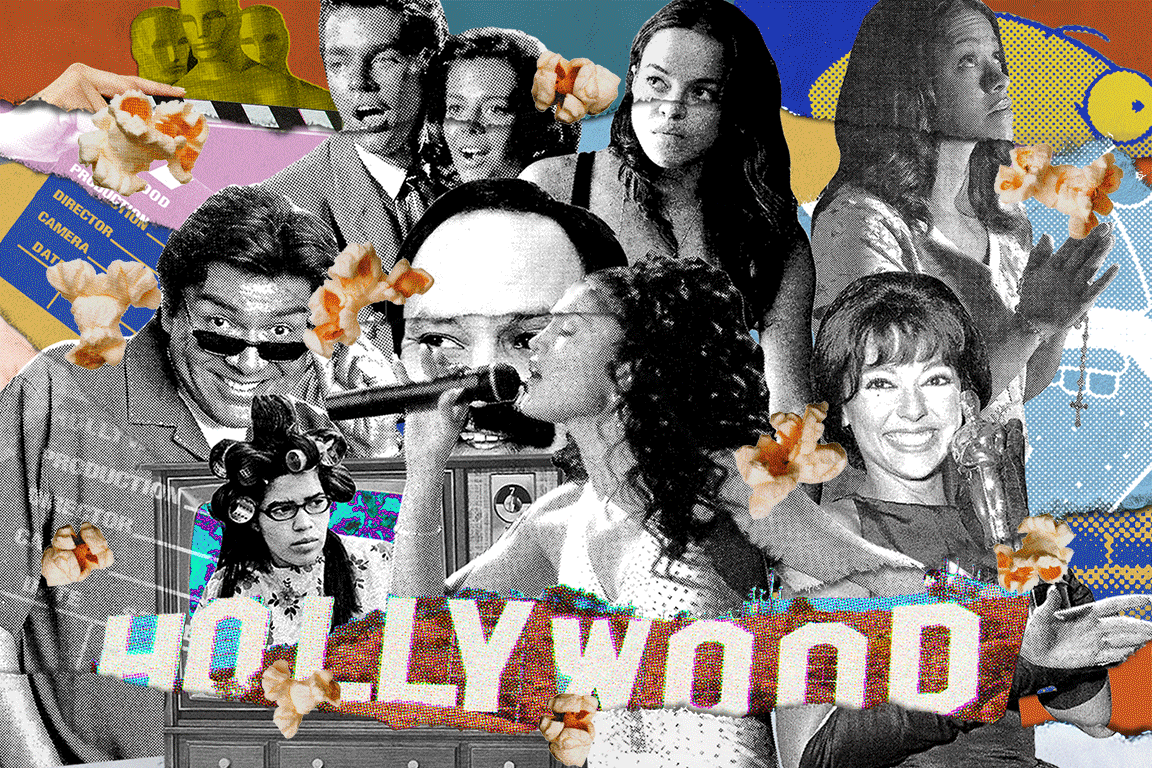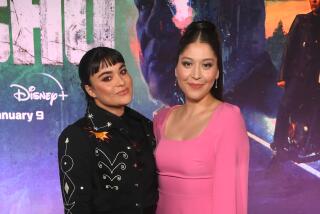Rita Moreno has Lin-Manuel Miranda’s back in ‘In the Heights’ colorism controversy
- Share via
Lin-Manuel Miranda has weathered criticism this week over the lack of darker-skinned Afro-Latinx lead performers in the new film version of his blockbluster musical “In the Heights.”
“We fell short,” he said in a statement Monday and continued to apologize on late-night TV the next day.
Now he has an impassioned defender: EGOT-winning icon Rita Moreno.
Appearing on “The Late Show With Stephen Colbert” Tuesday, Moreno was answering Colbert’s question about the burden of being a pioneer when she suddenly shifted gears: “Can we talk for a second about that criticism about Lin-Manuel? That really upsets me.”
Lin-Manuel Miranda and Jon M. Chu’s ‘In the Heights’ has an impressive cast, but little Afro-Latinx or LGBTQ+ representation. Now Miranda has apologized.
Although director Jon M. Chu’s film version of Miranda’s Tony-winning musical has been widely praised for its depiction of Washington Heights’ Latinx community in New York City, a viral video interview on the Root sparked a conversation about the lack of Afro-Latinx lead performers.
“You can never do right, it seems,” said Moreno, 89. “This is the man who literally has brought Latino-ness and Puerto Rican-ness to America. I couldn’t do it. I would love to say I did, but I couldn’t. Lin-Manuel has done that, really single-handedly, and I’m thrilled to pieces and I’m proud that he produced my documentary [‘Just a Girl Who Decided to Go for It’].”
“Rita Moreno: Just a Girl Who Decided to Go for It” looks at the ups and downs of the EGOT winner who’s had to overcome Hollywood racism and misogyny.
Colbert asked, “Are you saying that while you may understand where people’s concerns come from, that perhaps it’s misplaced in criticizing him in this?”
“I’m simply saying, ‘Can’t you just wait a while and leave it alone?’ There’s a lot of people who are Puerto Rican who are also from Guatemala who are dark and who are also fair. We are all colors in Puerto Rico. This is how it is.
“It would be so nice if they hadn’t come up with that and left it alone, just for now. I mean, they’re really attacking the wrong person.”
The audience applauded.
Hollywood’s Latino culture gap: How new and veteran creators are working to reverse a brutal history
A Times report on the many-layered history of Latinos in Hollywood, the low representation figures and what TV and movie creators are doing about it.
In his thoughtful Monday statement about the criticism, Miranda wrote, “I can hear the hurt and frustration over colorism, of feeling still unseen in the feedback. I hear that without sufficient dark-skinned Afro-Latino representation, the work feels extractive of the community we wanted to so much to represent with pride and joy.”
He addressed the issue again on Tuesday night’s “The Daily Social Distancing Show With Trevor Noah.”
“Your job as an artist is to write what’s missing,” Miranda said of his belief that people would want to see a musical about Latinx people in New York.
“With ‘In the Heights,’ it was ‘How many of us I can get on the board?’ That’s the goal. We’re all gonna be in this thing. Can we tell stories that are not about Latinos from the ‘50s with knives in their hands, which is incredibly overrepresented in musical theater, weirdly.”
Noah brought up the colorism criticism and praised Miranda for being open to it rather than responding defensively.
Lin-Manuel Miranda and Quiara Alegría Hudes explain the reasons behind the musical’s biggest tweaks from the stage to the screen.
“I felt defensive on your behalf, funnily enough,” said Noah, shouting, “‘Lin does so much! We have Black people singing on Broadway! Why are you doing this to Lin? You’re tearing down one of our own!’ But I honestly would love to know how you approached that criticism and what you think you could do better because you responded to it so meaningfully.”
“I can’t legislate how people feel,” Miranda responded. “All I want is for this neighborhood to feel seen, and if there’s a segment of it that doesn’t feel seen and they’re saying that, you have to acknowledge that and let it in. All I can do is learn from it and promise to do better.
Bodega coffee and raps about gentrification — we reflect on everything riding on Lin-Manuel Miranda’s cultural unicorn
“And again, there’s so [many] Afro-Latinos in the movie,” Miranda added. “The beef really was specifically dark-skinned Afro-Latinos in leading roles, in those leading, principal roles and ... I totally understand that, and I receive it and I just have to do better on the next one. But again, we took so much love and care and filmed on location ...
“So it’s like, I’m happy to take the learning from it and bring that to the next one and also hold space to be proud of this thing we made that has been half my life. I have to be able to hold both of those things because they’re both true. You are hearing from this community that feels underrepresented, that is hurting, and we made this thing and I’m proud of this thing and we don’t get to make things like this much.”
Latinx audiences, key to the success of “Fast and Furious,” are Hollywood’s most dependable customers. Now they’re helping movie theaters bounce back after COVID-19. Will they be rewarded?
Miranda isn’t splitting hairs when he talks about the criticism being specifically about darker-skinned Afro-Latinx people; one of the main characters, Nina, is played by a (relatively) fair-skinned Afro-Latinx actress, Leslie Grace.
In an interview with Harper’s Bazaar published the same day as the Root video, Grace said the Afro-Latinx presence “was definitely something that I was super mindful of as I was embodying Nina. Even in the audition process — to have read a role that looks and sounded like myself was already very rare. And then at the audition, to be in the space in the hallway where you’re seeing other girls that look like you auditioning for this role? That was also very rare.”
Still, Miranda did not dismiss the criticism, saying to Noah, “When you make something, you’re creating a frame and the folks that are not in that frame are going to tell you, ‘Hey, we’re not in the frame.’”
The Times has published a package on Hollywood’s Latino culture gap. We discuss this trend with legend Edward James Olmos and beloved star Cristela Alonzo.
Noah said, “One of the most beautiful explanations I got was from one of our writers ... ‘I don’t think anybody is angered at Lin because they think he did something. I think it’s because they know he’s the one person who will listen.’”
“That means the world to me, honestly,” Miranda responded, “because I am listening and I do want to do better with each project.”
More to Read
Only good movies
Get the Indie Focus newsletter, Mark Olsen's weekly guide to the world of cinema.
You may occasionally receive promotional content from the Los Angeles Times.













